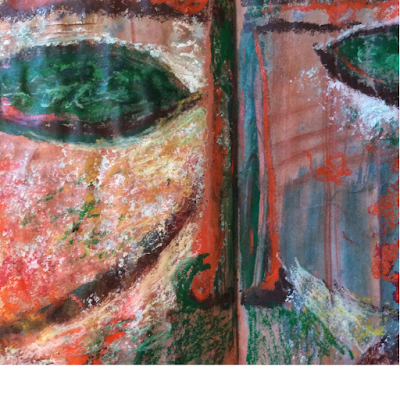Module Five – Chapter Eight – PAPER RELIEF INTO FABRIC RELIEF – PART ONE
Chapter Eight requires that five paper relief surfaces made for Chapter 3 are each translated into two different ways in fabric. For an easy reference I have placed both the photographic record from Chapter 1 (on the left) and its related paper relief surface from Chapter 3 (on the right) before the picture of each fabric sample.
Fabric sample 1 – First translation into fabric


The background is a layer of stitch and tear support irregularly wrinkled and sewn to a sheet of paper. On it fragments of different fabrics torn and shredded in imitation of rust “pebbles” (grey organza, cheesecloth, tulle net, cream-coloured jersey). Technique: appliqué.

Detail

Fabric sample 2 – Second translation into fabric


For this second interpretation in fabric I made a sandwich of a printed cotton, grey lining, curtain fabric and tarlatan, stitched them all together with randomly wavy lines and cut irregular diamond areas to reveal the background layer in different ways. Technique: wadded quilting.

Detail

Fabric sample 3 – First translation into fabric


For the background I burnt an old linen sheet with a candle in different areas and fixed it on a layer of soft kunin felt distressed along its edges. This background was then ripped and partially mended. Melted strips of synthetic net were stitched on it. Through the main gush at the centre different materials flourish from the bottom. Techniques: burnt and melted edges, appliqué, wadded quilting.

Detail

Fabric sample 4 – Second translation into fabric


For this second interpretation I wanted to obtain a less textured surface with a shallow relief. Techniques: wadded quilting, appliqué, machine embroidery.

Detail

Fabric sample 5 – First translation into fabric


For this heavily textured surface I prepared a substantial background with a sandwich of different fabrics, embroidered it, and made big tucks in all directions. I finished by padding some areas from the back. Techniques: wadded quilting, tucking, padded quilting.

Detail

Fabric sample 6 – Second translation into fabric


Techniques: shaped quilting (for the rust “pebbles”), free machine embroidery in the recessed areas.

Detail



These are so exciting. I particularly like the third one. Happy New Year .Sheila
ReplyDeleteFabulous samples as ever, Daniella, you certainly have a great flair for interpreting ideas, especially in Fabric sample 4 – Second translation into fabric, my favourite.
ReplyDeleteDaniela these are fantastic. You have been very busy! Happy New Year.
ReplyDeleteAmazing work. Wishing I could touch them all.
ReplyDeleteVery interesting and lovely work.
ReplyDelete